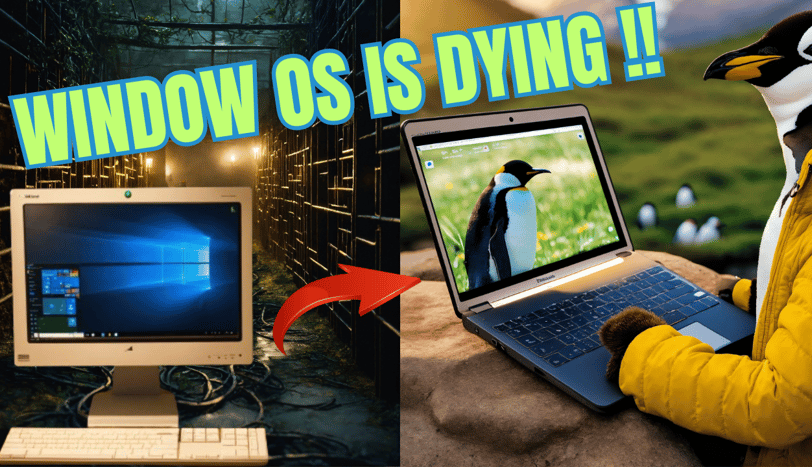7 Reasons Why I Ditched Windows for Linux
TRANSITION TO LINUX
Abhisek Das
12/18/20234 min read


As a Computer enthusiast. I’ve always been fascinated by Linux and the Free and Open Source movement. However, for me the turning point came in late 2021, when I fully embraced Linux — specifically, Debian — as my daily driver. At the time, I was working at a company that ran entirely on Linux, and it was a pivotal moment in my technological exploration.
Although I still used Windows on my personal machine, I spent most of my day on Linux at work. This experience allowed me to compare both operating systems up close, and the more I used Linux, the clearer it became that the supposed "downsides" were mostly myths. So, here are the seven main reasons why I ultimately made the switch from Windows to Linux.
1. Cost-Effectiveness: Linux is Free!
One of the biggest advantages of Linux is that it's completely free. Most Linux distributions (or “distros”) are available for download at no cost, unlike proprietary operating systems like Windows and Mac that often require expensive licenses. Even in the case of paid distros, like Red Hat Enterprise Linux, you’re paying for support and services—not for the OS itself.
When you install any Linux distribution, essential software like browsers, office tools, and utilities come preinstalled, saving you additional costs that you might incur on other platforms. And while Windows 10 may now be free to download from Microsoft’s official website, there’s a hidden cost: your data.
As the saying goes, “**If you’re not paying for the product, you are the product.**” In Windows’ case, your personal data is monetized for advertising and sold to third-party companies. With Linux, you don’t have to worry about that.
2. Open Source, Security, and Privacy
Linux is open-source, which means anyone can access, view, and modify its code. This transparency allows a global community of developers to inspect the code for bugs or vulnerabilities, making it inherently more secure. Compare this with closed-source systems like Windows, where only in-house developers handle security issues.
On top of that, Linux doesn’t require antivirus software, which can be costly and resource-intensive on Windows. The package management systems in Linux, like APT and Yum, and trusted repositories ensure that software installations are safe and reliable.
And when it comes to privacy, Linux is the clear winner. It doesn’t collect your data or have built-in trackers, advertising, or spyware like some other Operating Systems.
3. Lightweight and Versatile
Linux is incredibly lightweight and can run on almost any hardware. Whether you’re using a modern machine or an older, slower computer, there’s a Linux distro that will fit your needs.
For instance, to install Windows 10 or 11, your hardware must meet certain high minimum requirements. But with Linux, even an old PC can be revived and perform efficiently. Its lightweight design ensures that Linux runs faster and more smoothly than Windows or MacOS. Additionally, its modular structure allows you to remove unnecessary components, further enhancing performance.
4. Customization and Choice
One of the things I love most about Linux is the sheer level of customization it offers. Linux isn’t a one-size-fits-all operating system—it gives you the freedom to choose from a vast number of distributions and desktop environments, depending on your needs.
Whether you’re looking for a user-friendly distro like Ubuntu or Linux Mint, a more enterprise-focused OS like Red Hat, or a DIY option like Arch Linux or Gentoo, there’s something for everyone.
You can also choose your desktop environment, from sleek and modern ones like GNOME and KDE, to lightweight environments like XFCE or LXQT. This freedom lets you create a computing environment that’s perfectly tailored to your tastes.
5. Stability and Reliability
If you’ve ever faced unexpected crashes or freezes on Windows, you’ll appreciate the stability Linux offers. Linux is built on a monolithic kernel, which provides a stable foundation for the OS. Its modular design means you can select only the components you need, reducing the chance of crashes or performance issues.
For servers, Linux is the OS of choice precisely because of its stability. It’s no wonder that Linux powers 97% of the world’s servers** and 90% of supercomputers — the platform simply works.
6. Control Over Your System
One of Linux’s biggest strengths is the control it gives users over their systems. With Windows, you’re often at the mercy of automatic updates or bloatware that you never asked for. Linux, on the other hand, lets you control every aspect of the operating system.
You decide when and how to install software, whether or not to update your system, and which components to include or remove. This flexibility is perfect for anyone who wants their computer to function exactly the way they want it to—without forced updates or intrusive software.
7. Documentation and Community Support
Lastly, Linux has one of the best support systems you’ll find anywhere. Because it’s open-source, there’s a huge amount of documentation and community support available. Whether you’re troubleshooting a problem or looking for tips to customize your system, you’ll find comprehensive guides, forums, and wikis to help.
The Linux community is passionate, helpful, and always eager to share knowledge. If you run into any issues, you can be sure there’s someone in the community who has already faced it and can guide you through a solution.
Conclusion
So there you have it—these are the seven reasons that led me to make the switch from Windows to Linux.
Thanks for tuning in to NixNexus, and until next time: Keep Learning, Keep Tinkering, and Keep Embracing the Power of Open Source!
